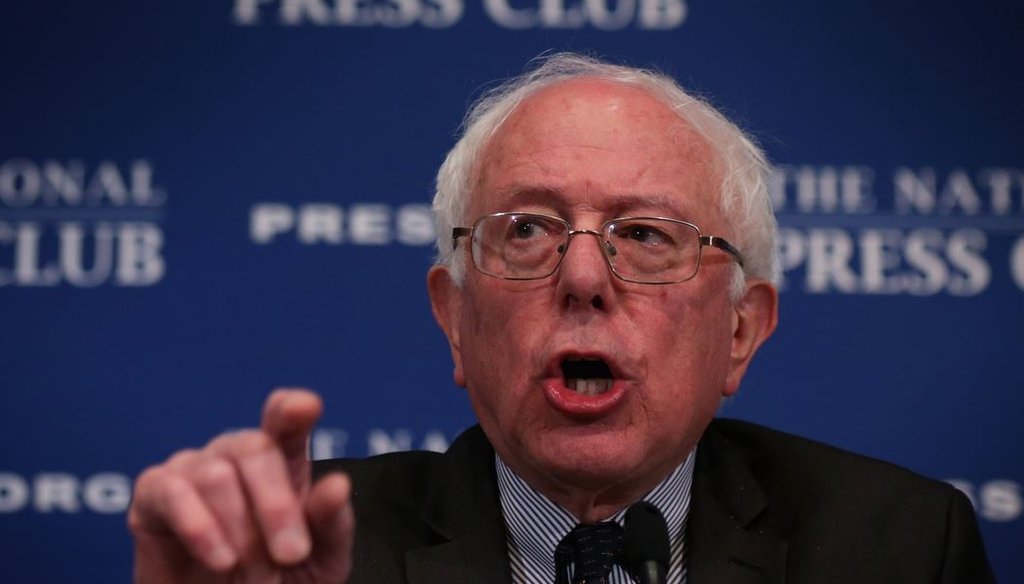Get PolitiFact in your inbox.

Sen. Bernie Sanders, I-Vt., speaks at a luncheon March 9, 2015 at the National Press Club in Washington, D.C. (Photo by Alex Wong/Getty Images)
With Sen. Bernie Sanders, I-Vt., expected to announce soon that he’s running for president in 2016, we thought we’d take a look back at his record on the Truth-O-Meter.
Sanders is an Independent, but he caucuses with Senate Democrats, and he is expected to join the Democratic primary race -- a field that so far officially includes only former Secretary of State Hillary Clinton. Before becoming a senator in 2007, Sanders was a member of the House of Representatives and mayor of Burlington, Vermont’s largest city.
Sanders’ record over the past five years includes five Trues, four Mostly Trues, four Half Trues, one Mostly False, four Falses and zero Pants on Fires.
We’ll be watching his campaign closely for more facts to check, but here are some highlights so far.
Sanders has long talked about challenges facing working Americans. For example, he said in 2011 that Americans "work the longest hours of any people around the world." That was true in 1997, but more recent data, from 2008, showed the U.S ranked eighth (out of 28 industrialized nations) when it comes to the annual number of hours actually worked per person. Additionally, there are many developing countries where people work more hours than Americans. We ruled that statement False.
Back in 2012, Sanders tweeted, "the Walton family of Walmart own more wealth than the bottom 40 percent of America." The statistic correctly compares the combined net worth of the bottom 41.5 percent of American families with the six Walton family members. Additional points -- that many people with a negative net worth are not necessarily poor, and that percentages about wealth distribution can be deceiving -- are important. Nevertheless, Sanders’ claim was solid, so we rated it True.
Recently, he said, "99 percent of all new income today (is) going to the top 1 percent." We found consensus among economists that the statistic and calculation offered by Sanders are credible, but it’s not the only way to consider income inequality. Other measures may be equally valid and produce different results. We rated the claim Mostly True.
He’s also a critic of tax breaks for wealthy corporations.
"One out of four corporations doesn't pay a nickel in (federal income) taxes," he said on CNN in 2013. He pointed to a Government Accountability Office study, which found for large U.S.-controlled corporations, one out of four paid no taxes. However, this figure lumps together companies that were able to dodge taxes with companies that had a bad year and ended up with no taxable income as a result. This, and other factors, disrupted Sanders’ point, so we rated the claim Half True.
In a 2010 floor speech, Sanders said, "Last year, ExxonMobil made $19 billion in profit. Guess what. They paid zero in taxes. They got a $156 million refund from the IRS." We found that the claim was, at best, misleading. It ignored the fact that the company paid hundreds of millions in state income taxes, sales taxes and other types of taxes. We rated his claim False.
During debate over the Affordable Care Act in 2009, Sanders criticized corporate interests in health care and said America spends "twice as much per capita on health care as any other nation on Earth." Our research found the United States spends more per capita on health care, but not "twice as much." So we rated this claim False.
Our Sources
See individual fact-checks for sources.














































